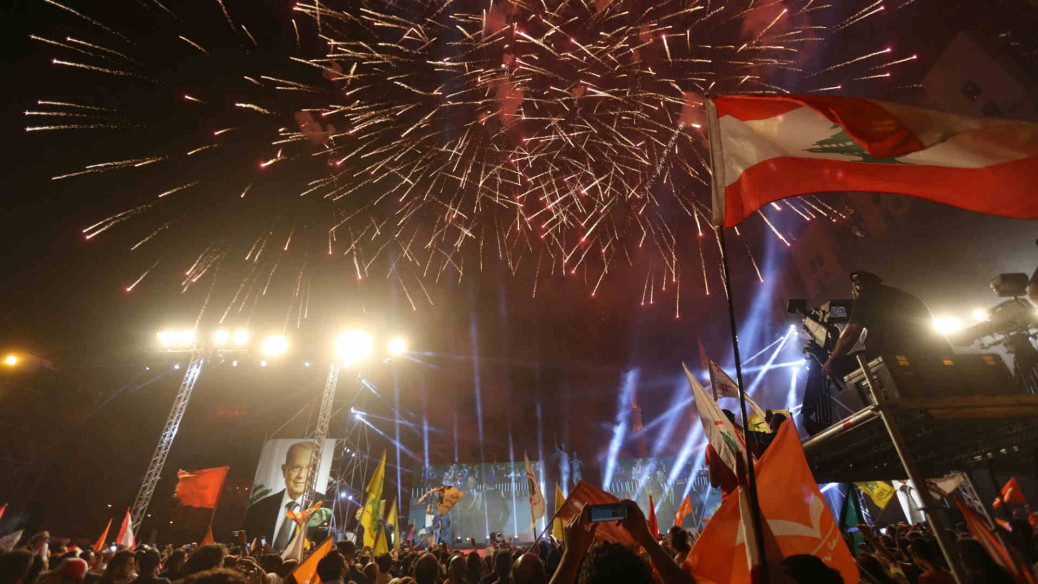BEIRUT, Lebanon -Lebanon has been facing a political vacuum with its parliament‘s term of office due to expire on June 20.
But a new draft law has sought to delay the crisis once more, extending parliament’s term until fresh elections can be held.
Months of dispute and weeks of hard negotiations came to a head on Friday as the law was agreed, ending a stalemate that threatened to leave Lebanon without a parliament.
Long-delayed elections are to be finally held in May 2018 while the legislature’s term will (again) be extended by almost a year to prepare for the first national polls in eight years.
Parliament has now extended its own mandate three times since it originally expired in 2013.
Current MPs elected in 2009 for an expected four-year term have stayed on as key political figures were unable to decide on an electoral law for fear of losing parliamentary seats.
“The fear of extension without a law and a set date for elections is gone, at least. We now have a guarantee that elections will be held,” said Marwan Maalouf, a member of the For the Republic Movement which has been actively campaigning since May 2013 to oppose the extension of parliament’s term.
The civil movement has grown, rallying groups and coalitions across the country, backing regular protests against these term extensions, condemned as unconstitutional. A group named the Whole Country coalition has held sit-in protests every Sunday outside parliament.
Civil activists have also been demanding a new, modern, law under which they would be able to bring in parliament representatives of civil society, as opposed to maintaining the same religious groups and traditional parties.
Unlike other movements, For The Republic has not been calling for any specific electoral law to be passed that would come at the detriment of holding parliamentary elections.
It is unthinkable to mobilise people over a technical issue like voting legislation, says Maalouf. Moreover, he stressed, those who drafted the new law are the same politicians who openly stated that the move should not jeopardise their presence in parliament.
Instead of spending time in discussing the specifics of the law, in his view, it is more sensible to work at a grassroots level and create a viable, strong political alternative that can attract good representation regardless of the type of law that is ratified.
The new law is set to introduce a proportional representation system for parliament and reduce the number of electoral districts from which lawmakers are elected. This should maintain the current proportions of parliamentary seat allocations for the country’s aray of different religious sects in each district.
While many MPs were adamant that it is not a perfect system, the proportional electoral law was approved by an overwhelming majority. Every political party has been publicly saying they were against the current majoritarian law.
Most parties had rejected holding new legislative elections based on the existing system, a sectarian-based law that dates back to 1960.
Alaa Sayegh, coordinator of the Mount Lebanon Movement, explained that some parties – mainly Hizballah and the Shia Amal Movement – would score the same seats under either law, however pushed for the proportional system with an aim of reducing the representation of their opponents, especially the Sunni-backed Future Movement.
Small parties opted for the new law, the civil activist continued, as they would get more chances to enter parliament through a proportional system.
Broadly speaking, Sayegh said the various parties, although set against one another, tend to work out some kind of deal around election time in order to ensure they all get an agreed number of parliamentarians.
“Each with their allegiances and calculations, political groups would first make temporary alliances to preserve their interests then go their own way once elections are over,” he noted.
While rejecting the extension of the parliament’s term, Sami Gemayel MP, chief of the Kataeb Party, anticipated that terms for lawmakers may yet be further extended to buy more time so to accommodate all parties’ interests.
He slammed “incompetent politicians” for procrastinating for four years.
But, even after these term extensions, Gemayel doesn’t think the time is right to hold elections given the current state of tension in the region – particularly with the ongoing Syrian conflict and heightened rivalry between Iran and Saudi Arabia which each back different groups in the small Mediterranean country.
“Lebanon is like a thermostat of what happens on a regional level, and there is no interest to bring conflict to this country. The Lebanese parliament today sits on a political balance, no one wants to upset this balance and lose their share.”
Lebanon’s political crisis, exacerbated by the war in Syria, had left the country without a head of state from May 2014 until October last year, when Michel Aoun, an ally of Hizballah, was elected president.
Sayegh says that parliament’s latest term extension has been motivated both by foreign and domestic challenges. First, political groups are not prepared – technically or financially – as their regional allies are currently busy with higher priorities than Lebanese elections.
Second, traditional parties fear tough competition from potential candidates from civil society groups. This is especially true after a May 2016 local election in Beirut saw Beirut My City, a new, politically unaffiliated coalition, win 40 percent of the vote.
The alliance emerged after civil society gained momentum in the 2015 protests over the government’s failure to solve a waste disposal crisis. Although the coalition failed to win any council seats, the result was a political blow to the established sectarian parties.
For The Republic’s Maalouf reiterated that, after 20 June, which marks the end of the legislature’s current mandate, parliament should be dissolved and MPs sent home.
“This is the only guarantee that elections will happen,” he said. “Otherwise, the more those MPs stay in their chairs, the more they will postpone national polls.”
Originally published in The New Arab

